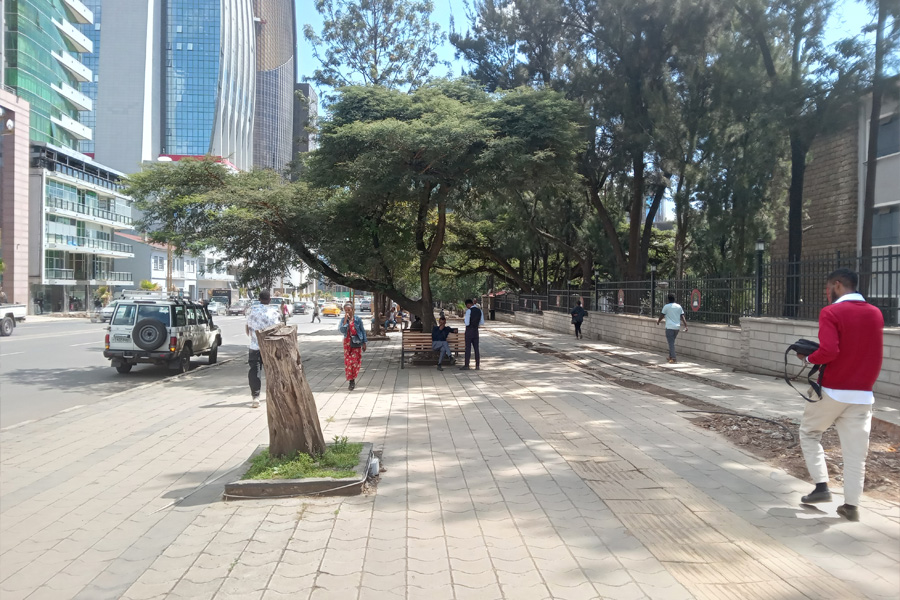
In-Picture | Nov 16,2024
May 18 , 2024
By AKSAH ITALO ( FORTUNE STAFF WRITER )
A recent regulatory change that removed the wage requirement for workers under private employment agencies, is sparking concerns about exploitation and a potential violation of worker rights. The law requiring agencies to pay workers at least 80pc of the salary received from the client company was revoked four months ago.
A Supreme Court ruling in favour of the Abay Private Employment Agencies Association, representing 12 member agencies, led to this change. The decision follows a dispute centred on Article 33, part of a regulation concerning worker wages. They argued the directive issued by the Ministry three years ago aimed to enforce an 80/20 rule over salary remained open for discussion and the Ministry overstepped its bounds. They claimed the Council of Ministers, not the Ministry, has authority over wage-related issues.
"We fought by ourselves and won," said Abel Worku, board chairman of the Association.
The ruling in favour of the Association has opened doors for other agencies to follow suit which ultimately led the regulation to be revoked by Nigussu Tilahun, former state minister for Labour & Skills. The Confederation of Ethiopian Trade Unions (CETU), representing about a million workers nationwide, was sidelined during this process.
Ayalew Ahmed, the vice president of CETU, is critical of the Ministry's lack of consultation.
"They decided this without talking to us," he said.
Ideally, the Tripartite Labour Advisory Board, comprised of labour unions, the government, and employers, should have discussed such matters. However, CETU's requests for immediate discussions with the Board have been met with repeated postponements by the Ministry.
"Meetings have been lagged," Ayalew said.
Officials at the Ministry acknowledge the gap in overseeing the case. According to Brook Ketema, an employment facilitation expert at the Ministry, they were focused on internal structural changes through reforms, which limited follow-up capacity on the case.
"There was a gap on our side," he said.
Brook said they are addressing it now; they have begun collecting data from both the agencies and the workers' side to make an informed decision.
However, the Ministry's subsequent inaction on appeal has raised concerns about the livelihoods of about 50,000 workers under private agencies. Asfaw Abebe, the president of the Federation of Tourism, Hotels & Service Union, fears this could lead to widespread abuse by employment agencies.
In a strong letter to the Confederation of Ethiopian Trade Unions (CETU), he decried the Ministry's decision and its potential consequences. Asfaw said employees' rights are violated with lower wages, and deteriorating working conditions that have escalated for the past few months.
“It has been dreadful,” he said.
His concerns are echoed by the Confederation of Amhara Trade Union, representing over 15,000 workers under 15 agencies. For the past few months, they have been unsuccessfully trying to negotiate with agencies to maintain the 80pc wage rule, established before the ruling.
Awol Hamid, head of the Kombolcha Union Confederation, blames the Ministry's inaction for the current situation. He argues that agencies are exploiting a legal loophole to justify lower wages, longer work hours, and denied leave for employees. He fears this will make it impossible to control agencies and protect worker rights.
"Everything has turned into chaos," said Awol.
The concerns are heightened with a recent study by the International Labour Organisation (ILO) based on a survey of 400 agency-recruited workers. It paints a grim picture, uncovering widespread violations of worker rights, including inadequate health and safety standards, unfair contractual agreements, and limitations on unionisation rights.
It seems to have escalated to retaliation against workers who speak out. Biniyam Worku, a technician employed by Siltun Balemuya, a prominent agency operating for over 31 years, was dismissed recently. Biniyam, who is also the board chairman of the Agency's Workers' Union, alleges he was targeted for his efforts to uphold worker rights.
"They don't even pay us a quarter at this point," he said.
Employment agencies, however, defend the recent changes.
Demelash Gulilat, the financial and marketing manager at Siltun Balemuya, feels the narrative is one-sided, focusing solely on worker rights without considering the agencies' perspective. He contends that the 80/20 rule creates financial burdens for agencies, arguing that capping service providers' fees is unfair.
"This is a free market economy without minimum wage laws," he told Fortune.
Demelash denied claims of retaliation against workers for advocating for their rights. He explained that suspensions at Siltun Balemuya result from workplace misconduct, not union activity. However, he acknowledged the financial challenges faced by agencies, arguing that these difficulties are often overlooked in the current discussion.
"Our major contributions have been overlooked," he told Fortune.
Authorities in Addis Abeba were having issues in the private employment agency sector before the recent changes. Sebehadin Sultan, the employment expansion director at the Addis Abeba Labour & Skills Bureau, which oversees 326 agencies, revealed that the Bureau had recently shut down seven agencies for lack of permits and poor working conditions. He is concerned that the new ruling will further complicate their efforts.
"It has made proper regulation difficult," he said.
Ethiopia's labour market faces a tough road ahead with about three million young people entering the workforce every year, far outstripping the available formal jobs. This is coupled with widespread informal work and working poverty, estimated in 2022 at 86pc and 18.3pc, respectively. Private employment agencies play a key role in connecting workers with jobs. However, removing the minimum wage requirement for these agencies raises concerns about exploitation and potential violations of worker rights.
Experts like Aida Awol, chief technical advisor at ILO, call for a new legal framework that protects workers' rights while considering the needs of employment agencies.
"Agencies' needs should also be considered," she said. "They are running a business after all."
She observes weak and ambiguous regulatory capacity open for loopholes. While advocating for a system that accommodates both parties, she recommends setting minimum wage laws as a long-term solution.
Workers are bearing the brunt of the issue. Their woes are exemplified by Tikuye Abere, employed under the Biraro Employment Agency in the Amhara Regional State. For him and 3,000 workers, Tikuye said the struggle has taken another form. Working as a security guard while supporting nine family members, Tikuye claims payment amounts have been fluctuating for a while.
"We're struggling," he said.
PUBLISHED ON
May 18,2024 [ VOL
25 , NO
1255]

In-Picture | Nov 16,2024

Fortune News | Nov 24,2024

Radar | Oct 27,2024

Featured | Sep 10,2023

Fortune News | Apr 28,2024

Agenda | Jul 06,2025

Radar | Jul 28,2025

Editorial | Apr 27,2024

Life Matters | Jun 07,2025

Radar | Oct 12,2024

Dec 22 , 2024 . By TIZITA SHEWAFERAW
Charged with transforming colossal state-owned enterprises into modern and competitiv...

Aug 18 , 2024 . By AKSAH ITALO
Although predictable Yonas Zerihun's job in the ride-hailing service is not immune to...

Jul 28 , 2024 . By TIZITA SHEWAFERAW
Unhabitual, perhaps too many, Samuel Gebreyohannes, 38, used to occasionally enjoy a couple of beers at breakfast. However, he recently swit...

Jul 13 , 2024 . By AKSAH ITALO
Investors who rely on tractors, trucks, and field vehicles for commuting, transporting commodities, and f...

Oct 25 , 2025
The regulatory machinery is on overdrive. In only two years, no fewer than 35 new pro...

Oct 18 , 2025
The political establishment, notably the ruling party and its top brass, has become p...

Oct 11 , 2025
Ladislas Farago, a roving Associated Press (AP) correspondent, arrived in Ethiopia in...

Oct 4 , 2025
Eyob Tekalegn (PhD) had been in the Governor's chair for only weeks when, on Septembe...